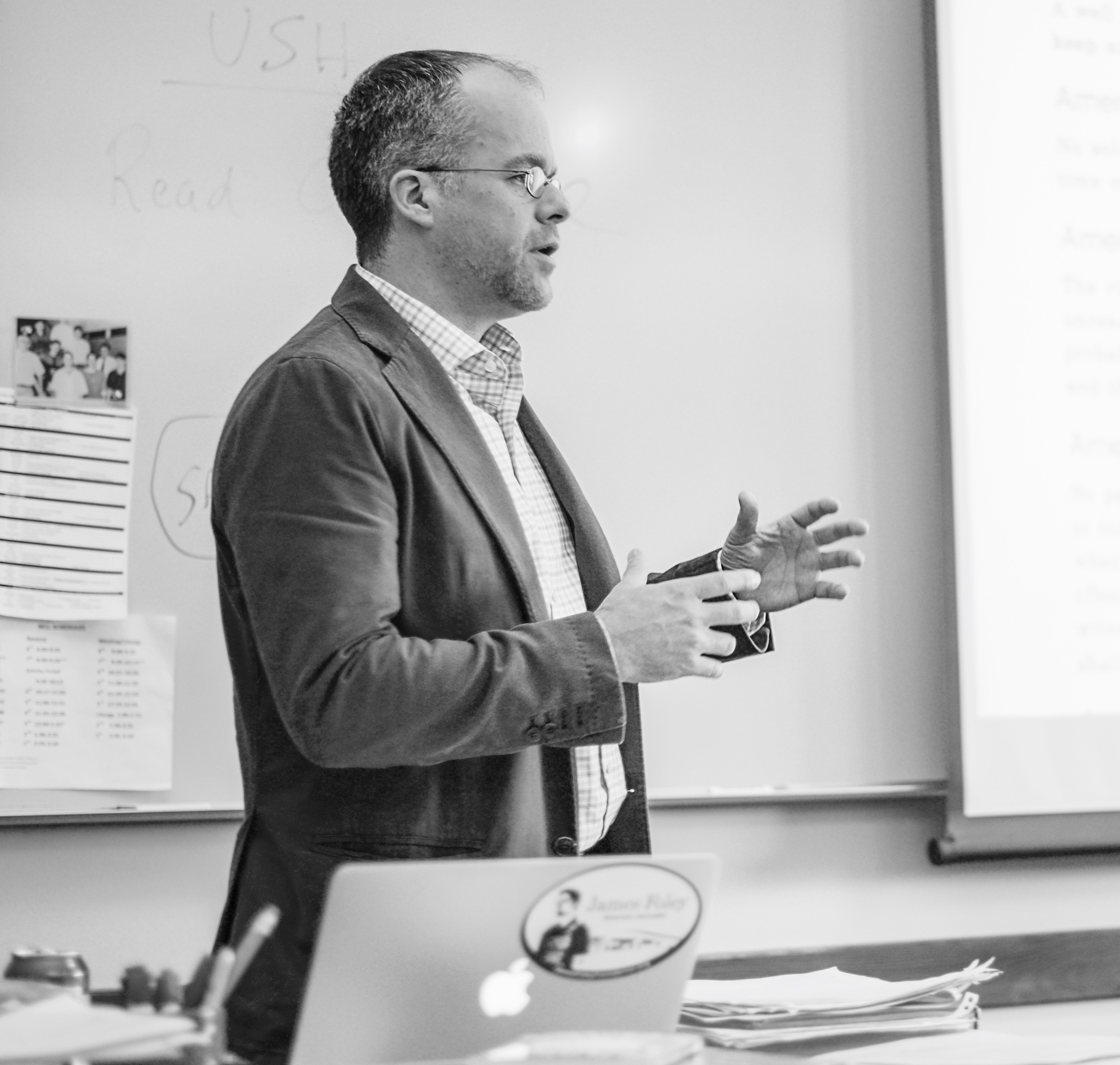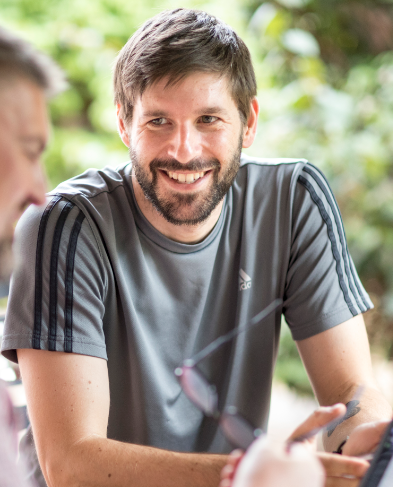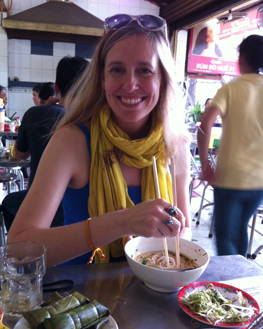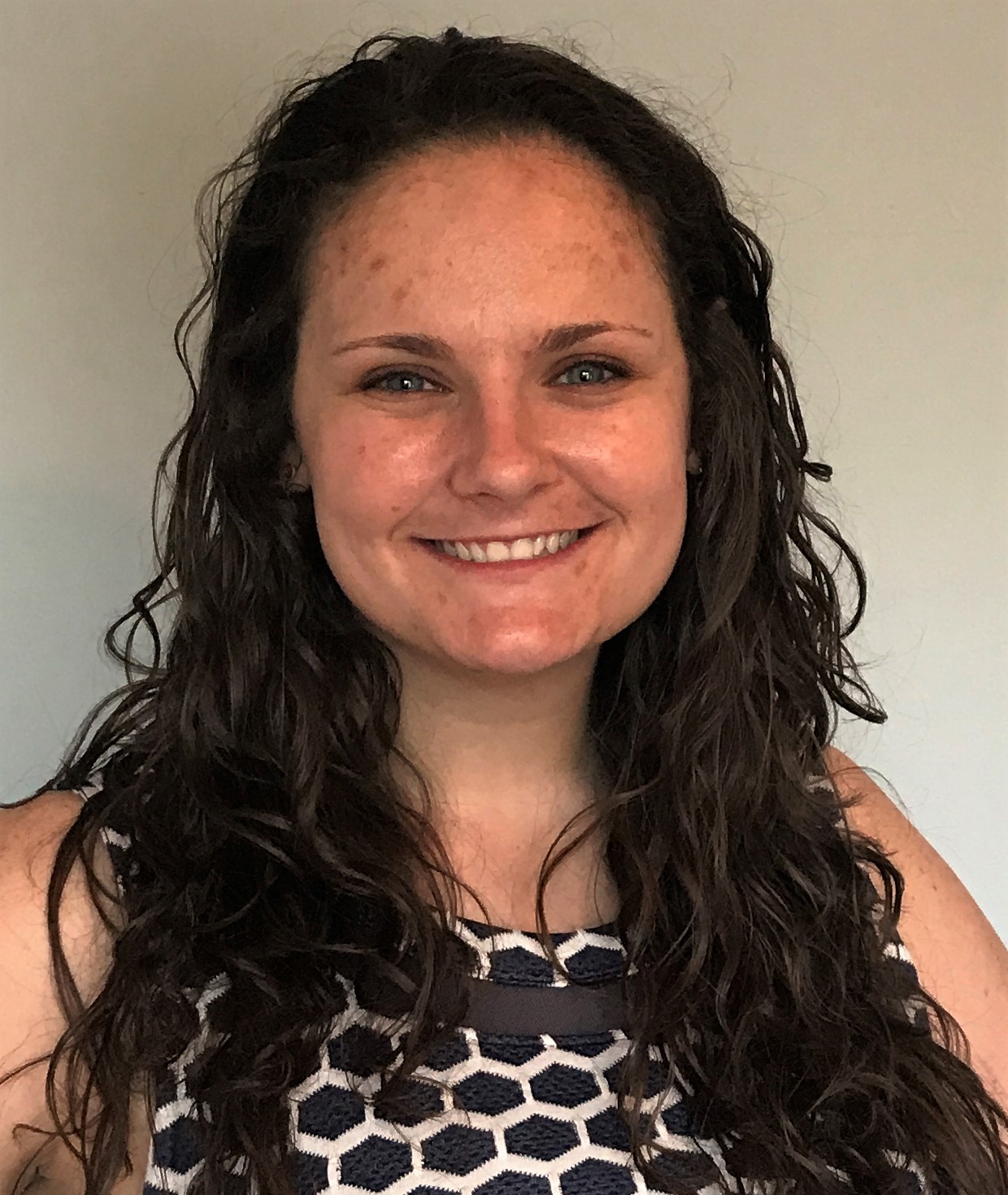 I graduated in 1997 with a History major and a minor in Political Science. After a year teaching high school history, I matriculated to the University of Wisconsin-Milwaukee for a MA in Public History and Historic Preservation. From there I worked as a Public Historian in a Cultural Resource Management Firm and then my own architectural design firm until 2009. I had always felt a calling to teach history, however, and I completed a BA in Secondary Education from Cardinal Stritch University in 2010. I currently teach history at Marquette University High School where I was awarded a Wisconsin Herb Kohl Teaching Fellowship. Future professional development will include more graduate level work in history and education administration.
I graduated in 1997 with a History major and a minor in Political Science. After a year teaching high school history, I matriculated to the University of Wisconsin-Milwaukee for a MA in Public History and Historic Preservation. From there I worked as a Public Historian in a Cultural Resource Management Firm and then my own architectural design firm until 2009. I had always felt a calling to teach history, however, and I completed a BA in Secondary Education from Cardinal Stritch University in 2010. I currently teach history at Marquette University High School where I was awarded a Wisconsin Herb Kohl Teaching Fellowship. Future professional development will include more graduate level work in history and education administration.
As a student in the MU History Department, I was challenged to engage the public in a variety of ways through participation in both local and national field schools and internships. This wide variety of immersion experiences continue to enhance my teaching inside and outside of the classroom. Inside the classroom, my students have engaged with a wide array of historians and historical organizations. That spirit of public engagement influences my students on my Civil War-era adventure trips and a Civil War Summer Institute geared for younger aged students.
 I graduated from Marquette in 2007 with a Bachelor of Arts in History and a cross-disciplinary minor in Africana Studies. I was also a graduate of the Honors Program and a Burke Scholar. I am a former Teach for America corps member (Phoenix 2008), where I taught middle school special education and earned a Master's of Education in Special Education from Arizona State University. After my time in Phoenix, I moved back to Milwaukee and taught middle and high school special education for six years. In 2016, I joined the Jesuit Refugee Service, where I continue to serve as the Regional Education Coordinator for Eastern and Southern Africa.
I graduated from Marquette in 2007 with a Bachelor of Arts in History and a cross-disciplinary minor in Africana Studies. I was also a graduate of the Honors Program and a Burke Scholar. I am a former Teach for America corps member (Phoenix 2008), where I taught middle school special education and earned a Master's of Education in Special Education from Arizona State University. After my time in Phoenix, I moved back to Milwaukee and taught middle and high school special education for six years. In 2016, I joined the Jesuit Refugee Service, where I continue to serve as the Regional Education Coordinator for Eastern and Southern Africa.
What first drew me to the history department was the experience of learning American history from a passionate and animated high school teacher, Lee Bouchonville, who got me more excited about history than any other school subject. As I began to study history more rigorously at Marquette, what I learned most was to become very curious about the narrative - to really understand the contours of particular historian's story, to learn about the context in which that story was crafted, and to figure out why that story was important or resonant. That curiosity has stuck with me professionally to this day and helps me really push myself to develop incisive questions, thorough answers, and sound analyses for the complicated issues that face me and my colleagues every day.
There's also tremendous value for me in having a good baseline level of knowledge about the history of modern Africa, which I was able to gain through my studies at Marquette. Knowing about patterns of human settlement, the impact of European colonialism, and the political history of different countries provides me with a more robust framework to interpret the current context and work with colleagues towards durable solutions.
Finally, studying history has helped me to be wary of our very human tendency towards simplistic diagnoses and solutions - what Chimamanda Ngozi Adichie has eloquently called "the danger of the single story". Really striking historical analysis spans across multiple domains - social, political, economic, demographic, geographic - and makes use of a wide range of sources to establish its arguments. No source is a silver bullet or a smoking gun - instead, each piece of information contributes to a deeper level of understanding, and ought to also prompt more critical questions. The human experience is complex, the world is vast and uneven, and studying history helped me appreciate these truths and become more comfortable with our discordant shared realities.
 “My interest in history has always been directly tied to my desire to understand the world today. As a historian, my end goal—in both my teaching and my writing—is to provide historical context for hot current issues like the significance of America’s role in NATO, women in combat, and U.S. nation building efforts in Afghanistan. This is why it is important to me to write op-eds, blog posts, and articles in popular newspapers and magazines – I believe that I have a responsibility as a historian to use my expertise to provide historical context on contemporary issues to as broad a public audience as possible beyond the literal walls of the classroom and the figurative walls of academia.”
“My interest in history has always been directly tied to my desire to understand the world today. As a historian, my end goal—in both my teaching and my writing—is to provide historical context for hot current issues like the significance of America’s role in NATO, women in combat, and U.S. nation building efforts in Afghanistan. This is why it is important to me to write op-eds, blog posts, and articles in popular newspapers and magazines – I believe that I have a responsibility as a historian to use my expertise to provide historical context on contemporary issues to as broad a public audience as possible beyond the literal walls of the classroom and the figurative walls of academia.”
Heather Stur graduated from Marquette University in 1998 with bachelors degrees in journalism and history. After working as a newspaper reporter for three years, she returned to Marquette in 2001 and received her MA in history in 2003. After earning her Ph.D. in history from the University of Wisconsin in 2008, she joined the faculty at the University of Southern Mississippi. Heather is the author of Beyond Combat: Women and Gender in the Vietnam War Era (2011), co-editor of Integrating the U.S. Military: Race, Gender, and Sexual Orientation Since World War II (2017), and author of numerous articles, book chapters, and blog posts, which have appeared in the New York Times, the National Interest, the Orange County Register, and various academic journals and anthologies. During the 2013-14 academic year, Heather was a Fulbright scholar in Vietnam, where she was a professor in the Faculty of International Relations at the University of Social Sciences and Humanities in Ho Chi Minh City.
 I graduated in 2012 with a double major in History and Secondary Education and a minor in Justice and Peace Studies. As a student, I was active at the Marquette University Center for Peacemaking, where I received a fellowship to work in Israel-Palestine. I also had the opportunity to study abroad in South Africa and intern in Northern Ireland. I was active in Phi Alpha Theta the History honor society. After graduation, I served as a Jesuit Volunteer in rural Alaska working at an alternative boarding school. I received a Rotary Global Grant Scholarship to study human rights and transitional justice at the Irish Center for Human Rights. After graduate school, I accepted a position with Heartland Alliance at a residential facility for unaccompanied minors in federal immigration custody. During my time with Heartland Alliance, I realized that I would be more effective as a mental health care provider; I am currently pursuing this goal studying to be a Mental Health Nurse Practitioner. As a Mental Health Nurse Practitioner, I will be able to continue working with youth in conjunction with school counselors, teachers, psychiatrists to provide holistic care to youth.
I graduated in 2012 with a double major in History and Secondary Education and a minor in Justice and Peace Studies. As a student, I was active at the Marquette University Center for Peacemaking, where I received a fellowship to work in Israel-Palestine. I also had the opportunity to study abroad in South Africa and intern in Northern Ireland. I was active in Phi Alpha Theta the History honor society. After graduation, I served as a Jesuit Volunteer in rural Alaska working at an alternative boarding school. I received a Rotary Global Grant Scholarship to study human rights and transitional justice at the Irish Center for Human Rights. After graduate school, I accepted a position with Heartland Alliance at a residential facility for unaccompanied minors in federal immigration custody. During my time with Heartland Alliance, I realized that I would be more effective as a mental health care provider; I am currently pursuing this goal studying to be a Mental Health Nurse Practitioner. As a Mental Health Nurse Practitioner, I will be able to continue working with youth in conjunction with school counselors, teachers, psychiatrists to provide holistic care to youth.
I am forever grateful for the friends, faculty, and community that shaped my time at Marquette University. I benefited from the Marquette community in both my professional and personal life. My history education challenged me to develop the critical thinking and writing skills, which allowed me to excel as an educator and social worker. The global perspectives and deep discussions I had with faculty members prepared me to work both abroad and in the United States. My time at Marquette challenged the way I analyzed history, the way I analyzed the world around me, and that has helped me develop the courage to be a woman for others and a network of friends and alum working on the most pressing problems facing our world.


 I graduated in 1997 with a History major and a minor in Political Science. After a year teaching high school history, I matriculated to the University of Wisconsin-Milwaukee for a MA in Public History and Historic Preservation. From there I worked as a Public Historian in a Cultural Resource Management Firm and then my own architectural design firm until 2009. I had always felt a calling to teach history, however, and I completed a BA in Secondary Education from Cardinal Stritch University in 2010. I currently teach history at Marquette University High School where I was awarded a Wisconsin Herb Kohl Teaching Fellowship. Future professional development will include more graduate level work in history and education administration.
I graduated in 1997 with a History major and a minor in Political Science. After a year teaching high school history, I matriculated to the University of Wisconsin-Milwaukee for a MA in Public History and Historic Preservation. From there I worked as a Public Historian in a Cultural Resource Management Firm and then my own architectural design firm until 2009. I had always felt a calling to teach history, however, and I completed a BA in Secondary Education from Cardinal Stritch University in 2010. I currently teach history at Marquette University High School where I was awarded a Wisconsin Herb Kohl Teaching Fellowship. Future professional development will include more graduate level work in history and education administration. I graduated from Marquette in 2007 with a Bachelor of Arts in History and a cross-disciplinary minor in Africana Studies. I was also a graduate of the Honors Program and a Burke Scholar. I am a former Teach for America corps member (Phoenix 2008), where I taught middle school special education and earned a Master's of Education in Special Education from Arizona State University. After my time in Phoenix, I moved back to Milwaukee and taught middle and high school special education for six years. In 2016, I joined the Jesuit Refugee Service, where I continue to serve as the Regional Education Coordinator for Eastern and Southern Africa.
I graduated from Marquette in 2007 with a Bachelor of Arts in History and a cross-disciplinary minor in Africana Studies. I was also a graduate of the Honors Program and a Burke Scholar. I am a former Teach for America corps member (Phoenix 2008), where I taught middle school special education and earned a Master's of Education in Special Education from Arizona State University. After my time in Phoenix, I moved back to Milwaukee and taught middle and high school special education for six years. In 2016, I joined the Jesuit Refugee Service, where I continue to serve as the Regional Education Coordinator for Eastern and Southern Africa. “My interest in history has always been directly tied to my desire to understand the world today. As a historian, my end goal—in both my teaching and my writing—is to provide historical context for hot current issues like the significance of America’s role in NATO, women in combat, and U.S. nation building efforts in Afghanistan. This is why it is important to me to write op-eds, blog posts, and articles in popular newspapers and magazines – I believe that I have a responsibility as a historian to use my expertise to provide historical context on contemporary issues to as broad a public audience as possible beyond the literal walls of the classroom and the figurative walls of academia.”
“My interest in history has always been directly tied to my desire to understand the world today. As a historian, my end goal—in both my teaching and my writing—is to provide historical context for hot current issues like the significance of America’s role in NATO, women in combat, and U.S. nation building efforts in Afghanistan. This is why it is important to me to write op-eds, blog posts, and articles in popular newspapers and magazines – I believe that I have a responsibility as a historian to use my expertise to provide historical context on contemporary issues to as broad a public audience as possible beyond the literal walls of the classroom and the figurative walls of academia.” I graduated in 2012 with a double major in History and Secondary Education and a minor in Justice and Peace Studies. As a student, I was active at the Marquette University Center for Peacemaking, where I received a fellowship to work in Israel-Palestine. I also had the opportunity to study abroad in South Africa and intern in Northern Ireland. I was active in Phi Alpha Theta the History honor society. After graduation, I served as a Jesuit Volunteer in rural Alaska working at an alternative boarding school. I received a Rotary Global Grant Scholarship to study human rights and transitional justice at the Irish Center for Human Rights. After graduate school, I accepted a position with Heartland Alliance at a residential facility for unaccompanied minors in federal immigration custody. During my time with Heartland Alliance, I realized that I would be more effective as a mental health care provider; I am currently pursuing this goal studying to be a Mental Health Nurse Practitioner. As a Mental Health Nurse Practitioner, I will be able to continue working with youth in conjunction with school counselors, teachers, psychiatrists to provide holistic care to youth.
I graduated in 2012 with a double major in History and Secondary Education and a minor in Justice and Peace Studies. As a student, I was active at the Marquette University Center for Peacemaking, where I received a fellowship to work in Israel-Palestine. I also had the opportunity to study abroad in South Africa and intern in Northern Ireland. I was active in Phi Alpha Theta the History honor society. After graduation, I served as a Jesuit Volunteer in rural Alaska working at an alternative boarding school. I received a Rotary Global Grant Scholarship to study human rights and transitional justice at the Irish Center for Human Rights. After graduate school, I accepted a position with Heartland Alliance at a residential facility for unaccompanied minors in federal immigration custody. During my time with Heartland Alliance, I realized that I would be more effective as a mental health care provider; I am currently pursuing this goal studying to be a Mental Health Nurse Practitioner. As a Mental Health Nurse Practitioner, I will be able to continue working with youth in conjunction with school counselors, teachers, psychiatrists to provide holistic care to youth.